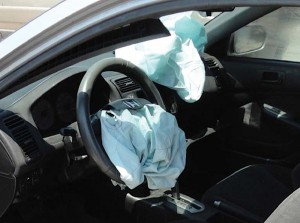From Ferrari to Subaru, the auto industry is ending 2015 with a flurry of safety-related recalls, more than 1 million in the last week alone.
Final figures for 2015 haven’t been released yet, but they’re expected to come in as a close second to the record 64 million vehicles recalled in the U.S. in 2014. And they cover a wide variety of issues and an even wider range of vehicles from faulty transmissions to fire hazards and exploding airbags.
The huge number of recalls over the last two years is not a surprise to Joan Claybrook, a former head of the National Highway Traffic Safety Administration. “The companies are more likely to behave and do a recall when they know the law is going to be enforced.”
Since the beginning of the decade, when Toyota was faulted for delaying a series of recalls related to so-called unintended acceleration, federal regulators have been cracking down on safety problems. They’ve announced a number of large fines, including $70 million for Chrysler and another $40 million for BMW, in just the last 30 days.
(BMW slammed with $40 mil fine for safety recall delays. Click Here for the story.)
And, under the new Federal Highway Act passed by Congress earlier in December, the NHTSA now has the authority to levy fines of up to $105 million for each violation, three times as much as before.
“The penalty for a failure to do a recall is going way up,” said Claybrook. “That may be encouraging manufacturers to get these things behind them.”
If a $105 million fine by NHTSA isn’t enough, the U.S. Justice Department has been adding its substantial weight to the enforcement effort. Toyota paid $1.2 billion as part of a settlement with prosecutors as a result of the unintended acceleration scandal. General Motors was fined $900 million as the result of a criminal investigation related to its long-delayed ignition switch recall.
GM also paid out nearly $600 million to settle claims filed with a special victims’ compensation fund set up on orders of CEO Mary Barra. More than 100 people are now believed to have died as a result of the flawed ignition switch.
As of last week, NHTSA said it now knows of nine people killed – eight in the U.S. – as a result of potentially faulty Takata ignition switches. That problem – which can see shrapnel sprayed into the passenger compartment when the bags inflate improperly during a crash – has led to the recall of about 20 million vehicles so far.
(As 9th death reported, new Takata recalls announced. Click Here for the latest.)
And the number is expected to continue growing. NHTSA this past week added still more models produced by Mazda, Honda and Subaru to the list. The exact number impacted by the latest recall is a bit unclear, according to a spokesman for the agency because some may already have been covered by previous recalls. But it could involve as many as 100,000 Hondas and 340,000 Subarus not previously affected by the Takata problem.
The variety of issues that have been covered by safety-related service actions this year is broad. In just the past month, 19,000 Mitsubishi Mirage models were recalled for excess corrosion; 44,000 Nissan Rogues were involved in a service action to fix a faulty transmission that could let them roll away; and Ford recalled 313,000 cars because of faulty headlights.
Some of the biggest problems this year have involved the risk of fire and faulty airbags. Fiat Chrysler last week was ordered to recall 570,000 SUVs, including the Jeep Grand Cherokee and Dodge Durango, due to fire hazards. Mercedes-Benz issued two separate recalls last week for gas leak problems involving just 860 vehicles.
Indeed, some recalls were miniscule. A total of 13 Rolls-Royce Phantoms were recalled on December 18th because their side curtain airbags may have been manufactured improperly. Less than 40 Mini Coopers were covered by a recall because of faulty occupant sensors in their seats. And 185 Ferrari California T sports cars were covered by a service action because of a fuel leak.
But, large or small, the recalls have added up this year and are expected to continue to be an issue in 2016, especially as manufacturers tighten their safety programs to avoid the increased fines now in NHTSA’s arsenal.
(Click Here for details about NHTSA’s $175 million in fines against Fiat Chrysler.)



I’d like to know, as many others probably do also, what does NHTSA due with these tremendous fines they are issuing? I haven’t heard of any benevolent actions resulting from their big takes. Is it just more for the Government to waste & squander?
Hugh,
We’ll try to get an answer. It may be that fines are relegated to the general fund v being applied to the budget of the individual department. Considering the overload NHTSA faces and the shortfall of its own budget, however, I’m sure they’d like to be able to apply the fines to expanding their testing and to handling the flood of consumer complaints.
Paul E.